

The Effects of Too Much Screen Time. Disclosure State Farm® (including State Farm Mutual Automobile Insurance Company and its subsidiaries and affiliates) is not responsible for, and does not endorse or approve, either implicitly or explicitly, the content of any third party sites hyperlinked from this page. State Farm has no discretion to alter, update, or control the content on the hyperlinked, third party site. Access to third party sites is at the user's own risk, is being provided for informational purposes only and is not a solicitation to buy or sell any of the products which may be referenced on such third party sites.
The information in this article was obtained from various sources not associated with State Farm®. While we believe it to be reliable and accurate, we do not warrant the accuracy or reliability of the information. The Harmful Effects of Too Much Screen Time for Kids. Today’s children have grown up with a vast array of electronic devices at their fingertips. They can't imagine a world without smartphones, tablets, and the internet. The advances in technology mean today's parents are the first generation who have to figure out how to limit screen time for children. While digital devices can provide endless hours of entertainment and they can offer educational content, unlimited screen time can be harmful.1 The American Academy of Pediatrics recommends parents place a reasonable limit on entertainment media. Despite those recommendations, children between the ages of 8 and 18 average 7½ hours of entertainment media per day, according to a 2010 study by the Henry J.
Many parents struggle to impose healthy limits on themselves too. Too Much Screen Time Linked to Anxiety & Depression in Young Children and Teens. New research finds that more hours of screen time are associated with lower well-being in those aged 2 to 17, with the association larger for adolescents than for younger children. San Diego State University psychologist Dr. Jean Twenge and University of Georgia psychology professor Dr. W. Teen Depression, Suicide Linked To Time Spent On Phones, Social Media. Researchers found a sudden increase in teens' symptoms of depression, suicide risk factors and suicide rates in 2012 — around the time when smartphones became popular, researcher Jean Twenge says.
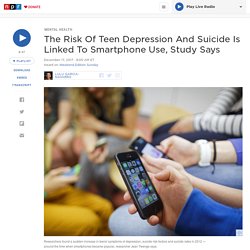
Thomas Trutschel/Photothek via Getty Images hide caption toggle caption Thomas Trutschel/Photothek via Getty Images Researchers found a sudden increase in teens' symptoms of depression, suicide risk factors and suicide rates in 2012 — around the time when smartphones became popular, researcher Jean Twenge says. Why screen time before bed is bad for children. Electronic devices intrude on time for sleep The presence and use of these devices is incredibly widespread.
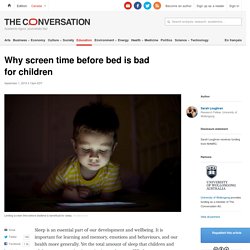
A 2006 survey showed that nearly all adolescents have at least one electronic device in their bedroom. Given this, and the increasing exposure to screen time – particularly in the hours before bedtime – it is perhaps not surprising that screen time is now associated with insufficient and poor quality sleep. But the relationship between screen time and sleep is more complex than that. Evening screen time can sabotage sleep. Screentime before bedtime may leave people feeling groggy in the morning.
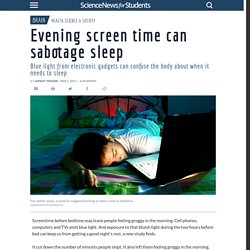
Cell phones, computers and TVs emit blue light. And exposure to that bluish light during the two hours before bed can keep us from getting a good night’s rest, a new study finds. It cut down the number of minutes people slept. It also left them feeling groggy in the morning. It’s been known for quite a while that “blue light is bad for sleep,” observes Shadab Rahman. Study: Too much screen time increases obesity risk for children.
MONDAY, Aug. 6, 2018 -- Kids are spending more time than ever in front of screens, making it more likely they'll become overweight or obese, a new review claims.

The average 8- to 18-year-old spends more than seven hours a day fixated on a screen, whether it's a computer, smartphone, tablet, video game or TV, the latest evidence shows. Teenagers who exceed two hours daily of recreational screen time are nearly twice as likely to be overweight or obese, the review showed. Excess weight increases the risk of heart disease, diabetes and other health problems. "Total media use increased by about 20 percent from 1999 to 2009, with most of that jump happening since 2004, and driven mainly by increases in computer use," said study lead author Tracie Barnett. She's a researcher at the INRS-Institut Armand Frappier and Sainte-Justine University Hospital Research Center in Montreal. But the TV is no longer the main creator of childhood couch potatoes. "That's shocking to me," said Dr. Too Much Screen Time Can Have Lasting Consequences for Young Children’s Brains.
Study links preschool screen time to behavioural and attention problems. EDMONTON—A new study links excessive screen time among preschoolers to behavioural problems they experienced at age five.

The research looked at more than 2,400 families and compared children who got at least two hours of daily screen time to those who had less than 30 minutes per day. Kids who spent more of their day in front of screens were five times more likely to exhibit clinically significant “externalizing” behavioural problems such as inattention. Two hours or more of screen time makes children 'badly behaved' Toddlers who spend hours staring at screens every day are more badly behaved by the time they are five, a study has claimed.
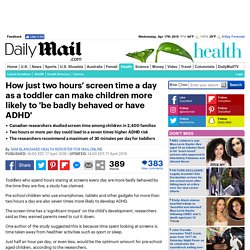
Pre-school children who use smartphones, tablets and other gadgets for more than two hours a day are also seven times more likely to develop ADHD. The screen time has a 'significant impact' on the child's development, researchers said as they warned parents need to cut it down. One author of the study suggested this is because time spent looking at screens is time taken away from healthier activities such as sport or sleep.
3 fears about screen time for kids. When Screen Time Is Actually a Good Thing. Soon after the notion of handheld technology came to be, rising concerns about children being driven to distraction from the mesmerizing lights, sounds, and images followed.
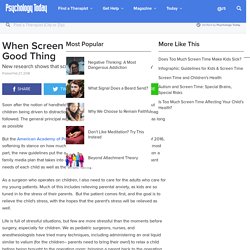
The general principal was to keep kids away, especially young ones, as long as possible But the American Academy of Pediatrics changed the guidelines in October of 2016, softening its stance on how much screen time (“digital media”) is okay. For the most part, the new guidelines put the onus on the parents and caregivers to decide on a family media plan that takes into account the health, education, and entertainment needs of each child as well as the whole family. article continues after advertisement As a surgeon who operates on children, I also need to care for the adults who care for my young patients.
Life is full of stressful situations, but few are more stressful than the moments before surgery, especially for children. I’ll never forget the first week the iPad came out. Screens May Affect Your Child's Brain Development. Screen time has little effect on teenagers' wellbeing, says study. Screen time has little effect on the psychological wellbeing of teenagers, regardless of whether they use devices for hours a day or just before bedtime, according to a study by researchers at Oxford University.
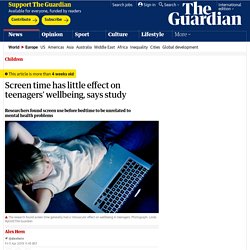
The research, based on analysis of the screen use of more than 17,000 teenagers across Ireland, the US and the UK, found use of screens before bedtime was completely unrelated to psychological wellbeing, and screen time more generally had a “minuscule” effect on wellbeing in teenagers when compared with other activities in an adolescent’s life. The effect was believed to be small enough that adolescents “would need to report 63 hours and 31 minutes’ more of technology use a day in their time-use diaries to decrease their wellbeing” by an amount big enough for them to notice. The study, published in the journal Psychological Science, is an important data point in the growing debate about whether excessive screen time can damage the mental health of young people.
The positive side to 'screen time' for kids and teens - The Irish News. CHILDREN incessantly using screens can be a perpetual problem for parents, who often struggle to persuade kids to leave their devices alone. Certainly, in the last decade, the time adolescents spend online has more than doubled, from an average of eight hours a week to 18.9 hours, and new research shows the majority of parents – almost nine in 10 – think gadgets get in the way of family time. On top of that, various studies have suggested screen use has an adverse effect on children and young people's mental and social wellbeing, increases obesity, and generally prevents youngsters from doing other potentially beneficial activities including exercise and face-to-face socialising.
Screen Time? How about Creativity Time? – MIT MEDIA LAB. [Excerpt from my book Lifelong Kindergarten: Cultivating Creativity through Projects, Passion, Peers, and Play] Discussions about children and new technologies have become increasingly polarized.

On one side are people who might be called techno-enthusiasts. They tend to get excited about the possibilities of almost all new technologies— the newer, the better. On the other side are people who might be called techno-skeptics. They worry about the negative impacts of new technologies, and they prefer that children spend more time with traditional toys and outdoor play and less time on screens. I get frustrated by both sides. Let’s start with the techno-enthusiasts.
There is a certain logic to all of this — but there’s a problem. In one classroom I visited, there was a large display at the front of the room, and each student had a network-connected laptop. The software was well-designed, and the teacher was happy to have easy access to well-organized data on student performance. Controversial Nature of Impact of Screen Time on Children.
6 Ways to Reduce Screen Time. The Effects of Too Much Screen Time.